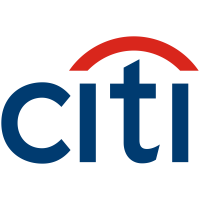
Citigroup Inc
NYSE:C


| US |

|
Johnson & Johnson
NYSE:JNJ
|
Pharmaceuticals
|
| US |

|
Berkshire Hathaway Inc
NYSE:BRK.A
|
Financial Services
|
| US |

|
Bank of America Corp
NYSE:BAC
|
Banking
|
| US |

|
Mastercard Inc
NYSE:MA
|
Technology
|
| US |

|
UnitedHealth Group Inc
NYSE:UNH
|
Health Care
|
| US |

|
Exxon Mobil Corp
NYSE:XOM
|
Energy
|
| US |

|
Pfizer Inc
NYSE:PFE
|
Pharmaceuticals
|
| US |

|
Palantir Technologies Inc
NYSE:PLTR
|
Technology
|
| US |

|
Nike Inc
NYSE:NKE
|
Textiles, Apparel & Luxury Goods
|
| US |

|
Visa Inc
NYSE:V
|
Technology
|
| CN |

|
Alibaba Group Holding Ltd
NYSE:BABA
|
Retail
|
| US |

|
3M Co
NYSE:MMM
|
Industrial Conglomerates
|
| US |

|
JPMorgan Chase & Co
NYSE:JPM
|
Banking
|
| US |

|
Coca-Cola Co
NYSE:KO
|
Beverages
|
| US |

|
Walmart Inc
NYSE:WMT
|
Retail
|
| US |

|
Verizon Communications Inc
NYSE:VZ
|
Telecommunication
|
Utilize notes to systematically review your investment decisions. By reflecting on past outcomes, you can discern effective strategies and identify those that underperformed. This continuous feedback loop enables you to adapt and refine your approach, optimizing for future success.
Each note serves as a learning point, offering insights into your decision-making processes. Over time, you'll accumulate a personalized database of knowledge, enhancing your ability to make informed decisions quickly and effectively.
With a comprehensive record of your investment history at your fingertips, you can compare current opportunities against past experiences. This not only bolsters your confidence but also ensures that each decision is grounded in a well-documented rationale.
Do you really want to delete this note?
This action cannot be undone.

| 52 Week Range |
51.11
72.5
|
| Price Target |
|
We'll email you a reminder when the closing price reaches USD.
Choose the stock you wish to monitor with a price alert.

|
Johnson & Johnson
NYSE:JNJ
|
US |

|
Berkshire Hathaway Inc
NYSE:BRK.A
|
US |

|
Bank of America Corp
NYSE:BAC
|
US |

|
Mastercard Inc
NYSE:MA
|
US |

|
UnitedHealth Group Inc
NYSE:UNH
|
US |

|
Exxon Mobil Corp
NYSE:XOM
|
US |

|
Pfizer Inc
NYSE:PFE
|
US |

|
Palantir Technologies Inc
NYSE:PLTR
|
US |

|
Nike Inc
NYSE:NKE
|
US |

|
Visa Inc
NYSE:V
|
US |

|
Alibaba Group Holding Ltd
NYSE:BABA
|
CN |

|
3M Co
NYSE:MMM
|
US |

|
JPMorgan Chase & Co
NYSE:JPM
|
US |

|
Coca-Cola Co
NYSE:KO
|
US |

|
Walmart Inc
NYSE:WMT
|
US |

|
Verizon Communications Inc
NYSE:VZ
|
US |
This alert will be permanently deleted.
 Citigroup Inc
Citigroup Inc
Intrinsic Value
The intrinsic value of one
 C
stock under the Base Case scenario is
89.71
USD.
Compared to the current market price of 70.75 USD,
Citigroup Inc
is
Undervalued by 21%.
C
stock under the Base Case scenario is
89.71
USD.
Compared to the current market price of 70.75 USD,
Citigroup Inc
is
Undervalued by 21%.
The Intrinsic Value is calculated as the average of DCF and Relative values:

Valuation History
Citigroup Inc

Uncover deeper insights with the Valuation History. Learn how current stock valuations stack up against historical averages to gauge true investment potential.
Start now and learn if your stock is truly undervalued or overvalued!
Stock is trading at its lowest valuation over the past 5 years.

To access the results of this valuation backtest, please register an account with us. Registration is quick and gives you instant access to insights on 3 stocks per week for free.
Historical valuation for  C cannot be conducted due to limitations such as insufficient data or other constraints.
C cannot be conducted due to limitations such as insufficient data or other constraints.
Fundamental Analysis
Select up to 3 indicators:
Select up to 3 indicators:
Months
Months
Months
Months
Select up to 2 periods:


Balance Sheet Decomposition
Citigroup Inc

| Net Loans | 670.6B |
| Investments | 1.3T |
| PP&E | 30.1B |
| Intangibles | 23.8B |
| Other Assets | 380.6B |
| Total Deposits | 1.3T |
| Short Term Debt | 319.7B |
| Long Term Debt | 299.1B |
| Other Liabilities | 292.8B |
Wall St
Price Targets
C Price Targets Summary
Citigroup Inc

According to Wall Street analysts, the average 1-year price target for
 C
is 82.43 USD
with a low forecast of 66.66 USD and a high forecast of 115.5 USD.
C
is 82.43 USD
with a low forecast of 66.66 USD and a high forecast of 115.5 USD.
Dividends
Current shareholder yield for  C is
.
C is
.
Shareholder yield represents the total return a company provides to its shareholders, calculated as the sum of dividend yield, buyback yield, and debt paydown yield. What is shareholder yield?
Ownership
C Insider Trading
Buy and sell transactions by insiders

| Period | Sold | Bought | Net |
|---|---|---|---|
| 3 Months |
|
|
|
| 6 Months |
|
|
|
| 9 Months |
|
|
|
| 12 Months |
|
|
|
The intrinsic value of one
 C
stock under the Base Case scenario is
89.71
USD.
C
stock under the Base Case scenario is
89.71
USD.
Compared to the current market price of 70.75 USD,
 Citigroup Inc
is
Undervalued by 21%.
Citigroup Inc
is
Undervalued by 21%.



































 You don't have any saved screeners yet
You don't have any saved screeners yet